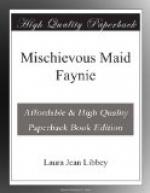In a moment he was kneeling before the safe. To his intense satisfaction the knob yielded to his deft touch.
“I shall have less trouble than I anticipated,” he muttered, with a little chuckle.
Faynie stood motionless, scarcely three feet behind him, watching him intently, with horror-stricken eyes and glued tongue.
She saw him take a roll of bills, and after carefully counting them, transfer them to his pocket.
Heirlooms, too, in the way of a costly diamond stud, sleeve links, and massive watch and chain, which had been her father’s, went the same way.
Faynie seemed incapable of interfering.
“Now we will soon determine what else there is here of importance—my time cannot be more profitably spent than by informing myself.”
Paper after paper he carefully unfolded, glancing quickly through their contents, and as quickly tossing them back into the safe.
Evidently he had not yet found that for which he was searching so intently.
Suddenly he came across a large square envelope, the words on which seemed to arrest his attention at once. And in a whispered, yet distinctly audible voice, he read the words:
“Horace Fairfax, last message to his wife—dated March 22, 18—.”
“Why that is the very date upon which he died,” muttered Kendale. “This must have been written just before he committed suicide. Well, we will see what he had to say.”
And slowly he read, half aloud, as follows:
“My dear wife: When you read the words here penned I shall be no more. I know your heart will be most bitter against me for what I have just done, but, realizing that my end was near, I have done it for the best.
“I refer to the making of my will.
“When a man sees
death before him, he naturally wishes to see those
nearest and dearest
to him provided for, so far as he is able to do
so.
“You will remember
distinctly the conversation we had at the time I
proposed marriage to
you. I reminded you that I was a widower,
with a daughter whom
I loved far better than the apple of my eye.
“I told you that this daughter would succeed to all my wealth, if she lived, when time was no more with me; that no being on earth could ever change my views in this regard—ay, in fulfilling my duty.
“I asked you to marry me, knowing fully my intention in this matter, stating at the time that I would give you in cash an ample sum of money, which, if used frugally and judiciously, should last you the remainder of your natural life, providing you outlived me.
“You accepted
me under those conditions; you married me, and I, as
agreed, gave to you
in a lump sum the money stipulated.




